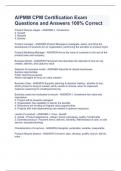AIPMM CPM Certification Exam Questions and Answers 100% Correct
Product lifecycle stages - ANSWER-1. Introduction
2. Growth
3. Maturity
4. Decline
Product manager - ANSWER-Product Managers investigate, select, and drive the development of products for an organization, performing the activities or product mgmt.
Product Marketing Manager - ANSWER-Act as the voice of customer to the rest of the product team and company.
Business Model - ANSWER-Framework that describes the rationale of how an org. creates, delivers, and captures value
Reasons for business model - ANSWER-Describe & classify businesses
Explore opportunities
Public reporting purposes
Allows managers to focus on value creation
Business Case - ANSWER-Supports planning & decision making - whether to buy, which product to bring to market, which vendor to choose, when to implement
Captures reasoning for creating/enhancing
Business cases are evaluated to ensure - ANSWER-1. Investment has value and importance
2. Project will be properly managed
3. Organization has capability to deliver the benefits
4. Resources are working on highest value opportunities
5. Projects with inter-dependencies are started in optimum sequence
Levels of a product - ANSWER-1. Core - benefit
2. Actual - Product appearance - design, brand, packaging, quality, functionality
3. Extended product - Payment terms, delivery, warranty, Maintenance & care, on site service, education/training
Characteristics of a service - ANSWER-intangible, perishable, variable, inseparable
Product lifecycle phases - ANSWER-Conceive, plan, develop, qualify, launch, deliver, retire Name 5 key deliverables during product lifecycle and the phases they are important - ANSWER-Strategic plan, competitive analysis, market trends, MRD, business case, PRD, product roadmaps, marketing strategic plan, Beta program plan, launch plan, marketing plan, end of life plan
Product lifecycle knowledge areas - ANSWER-Business, market, organization, product, customer
Marketing objective for commercialization strategies - ANSWER-Introduction - Gain awareness
Growth - Stress differentiation
Maturity - Maintain brand loyaly
Decline - Harvest and deletion
Product - ANSWER-A good or service offered by an organization which affords a bundle
of benefits both objective (physical) and subjective (image) to a user
Goods - ANSWER-Goods marketing relates to selling physical products - durable and nondurable
Service Goods - ANSWER-Rented goods services, owned-goods services, non-goods services; shared services (consolidated and shared services by different units within an organization - finance, HR, security)
Types of consumer products - ANSWER-convenience product, shopping product, specialty product, unsought product, consumer product
Service - ANSWER-Product that is not embodied in a physical good and that typically effects some change in another product, person, or institution (example: painted nails)
4 P's of Marketing - ANSWER-Product, Price, Place, Promotion
3 P's of Service - ANSWER-People, Process, Physical proof
Product line - ANSWER-a group of closely related product items with similar attributes or target markets (iPhones)
Fill considerations - ANSWER-Product attributes - fuel type, engine size, capacity, size
Stretch considerations - ANSWER-Buying power, target customer
Product line extension - ANSWER-the use of an established product brand name for a new item in the same product category.
Product width/breadth - ANSWER-Number of different product categories offered by company




